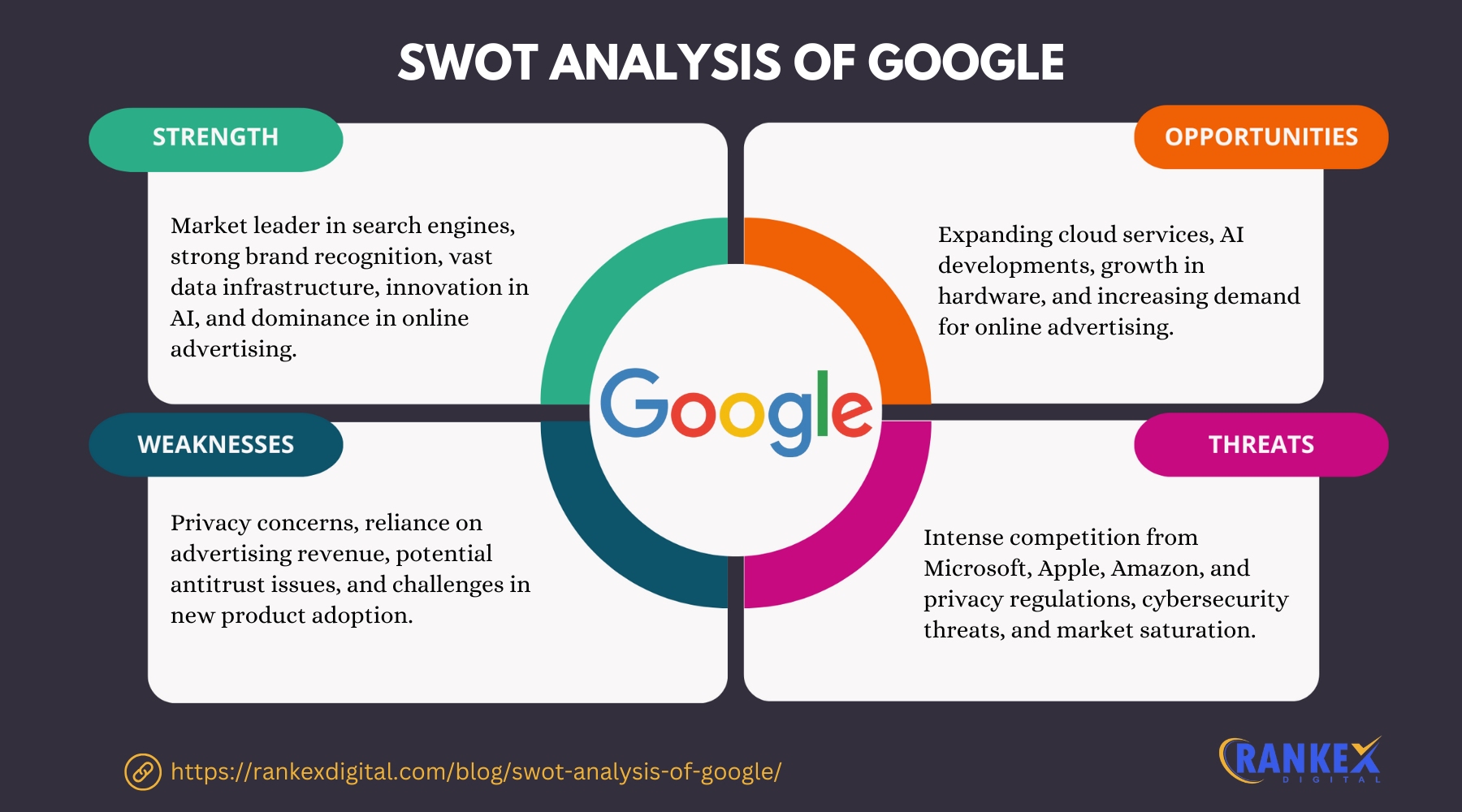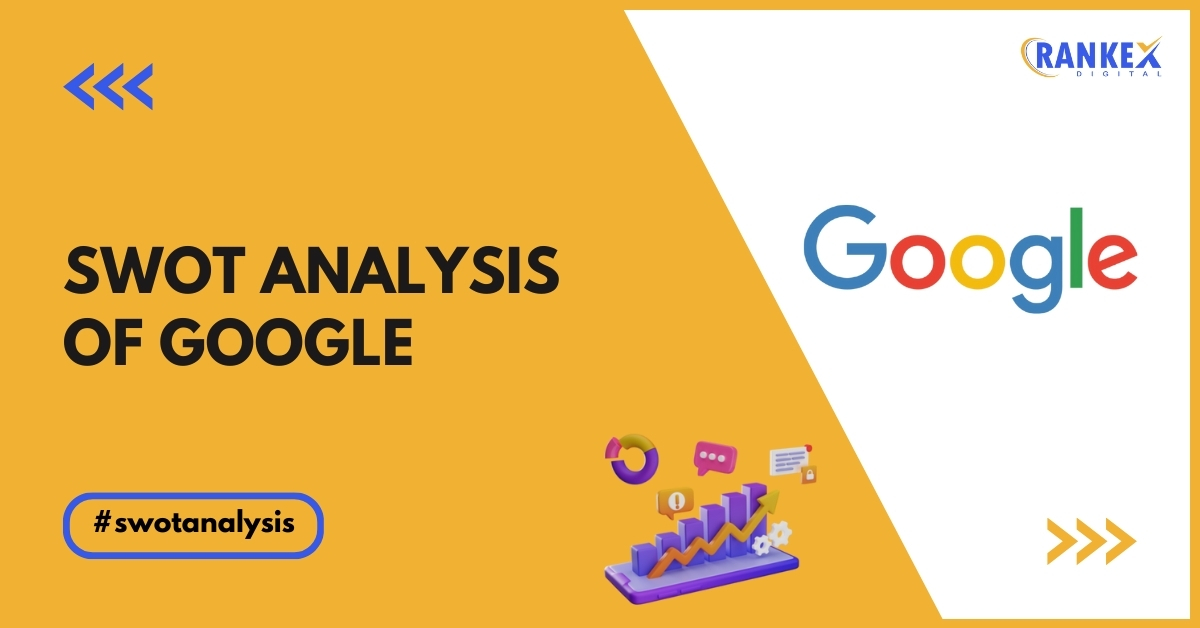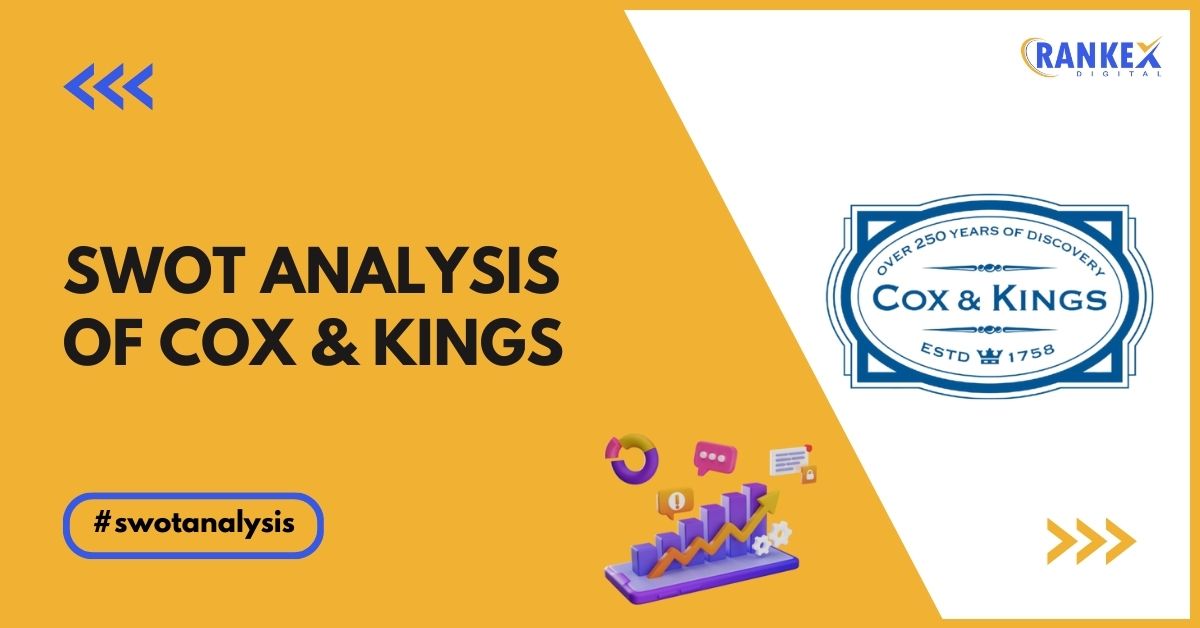Google, a subsidiary of Alphabet Inc., is one of the world’s most influential tech companies, known for its search engine, digital advertising, cloud computing, and various other products and services. Since its inception in 1998, Google has revolutionized the digital world, continuously expanding its reach and diversifying its portfolio.
Understanding the strengths, weaknesses, opportunities, and threats (SWOT) of Google helps in analyzing its market position and planning for future success.
This article provides a detailed SWOT analysis of Google, examining its key attributes and challenges in a competitive digital landscape.
In this blog
Overview of Google

Founded by Larry Page and Sergey Brin while they were PhD students at Stanford University, Google was initially a search engine project designed to organize the world’s information.
Since its IPO in 2004, Google has expanded into various industries, including cloud services, hardware, and AI development.
The company is headquartered in Mountain View, California, and is known for its innovative products like Android, YouTube, Google Maps, Google Cloud, and Google Ads.
Quick Stats About Google:
| Attribute | Details |
|---|---|
| Founder | Larry Page & Sergey Brin |
| Year Founded | 1998 |
| Origin | Mountain View, California, USA |
| Number of Employees | 180,000+ |
| CEO | Sundar Pichai |
| Company Type | Public (Part of Alphabet Inc.) |
| Market Cap | $1.6 Trillion |
| Annual Revenue | $290 Billion |
| Net Profit | $60 Billion |
Current News of Google:
- AI Developments: Google is heavily investing in AI and machine learning, integrating these technologies into its products to improve user experience.
- Privacy Initiatives: The company has been working on enhancing privacy features for users across its platforms, following increasing scrutiny over data collection.
- Sustainability Goals: Google has committed to running its data centers on renewable energy and aims for carbon-free operations by 2030.
- Acquisitions and Partnerships: Google continues to acquire startups in the AI, cloud, and hardware sectors to maintain its competitive edge.
SWOT Analysis of Google

Strengths of Google
- Market Leadership in Search and Advertising:
Google is the undisputed leader in the search engine market, with over 90% global market share. Its dominant position in search ensures it remains a top destination for users and advertisers alike. Google Ads is a major revenue driver, allowing businesses to target users with personalized ads across Google’s ecosystem. This dominance in advertising is the foundation of Google’s financial success. - Innovative Product Portfolio:
Google offers a wide range of products and services that are integrated into daily life. Android powers the majority of smartphones worldwide, while YouTube is the leading video-sharing platform. Google Maps helps millions of users navigate, and Google Assistant is a widely used AI-based assistant. Google Cloud, while still behind competitors like AWS and Azure, continues to grow, providing cloud computing solutions for businesses. - Strong Brand Recognition:
Google is one of the most recognizable brands globally. It’s associated with high-quality, user-friendly products. Its brand is synonymous with reliability, and it enjoys high user loyalty, which helps Google maintain its strong market position and attract new users and customers. - Technological Innovation:
Google leads in technological advancements, particularly in AI, cloud computing, and machine learning. Google Tensor, a custom-built processor, powers Google’s latest devices and helps in optimizing machine learning tasks. Google Lens, an image recognition tool, is another example of innovation that enhances user experience. The company is also continually refining its AI-driven search algorithms, ensuring that its search engine remains the best. - Financial Strength:
Google’s parent company, Alphabet, has a massive cash reserve, allowing it to invest in new technologies, acquire promising startups, and expand into new markets. This financial strength provides Google with a cushion to weather market fluctuations and pursue long-term strategic goals.
Weaknesses of Google
- Dependence on Advertising Revenue:
A large portion of Google’s revenue comes from its advertising business. If there were significant changes in the digital advertising market, such as shifts in consumer behaviour, regulatory restrictions, or growing competition, Google’s revenue could be negatively impacted. - Privacy Concerns:
Google has faced several controversies regarding user privacy, especially around data collection, targeted advertising, and user tracking. This has led to regulatory scrutiny from governments around the world. Data breaches or perceived invasions of privacy could harm Google’s reputation and trust with users. - Antitrust Issues:
Google’s dominance in search and advertising has led to numerous investigations and lawsuits concerning antitrust violations. Regulators in the U.S. and Europe have scrutinized Google’s practices for stifling competition. Antitrust actions could result in fines, restrictions, or changes to how Google operates in certain markets. - Limited Hardware Success:
While Google has made significant efforts to enter the hardware market (e.g., Pixel smartphones, Google Home, Nest), it has not achieved the same level of success as competitors like Apple and Amazon. Products like the Pixel phone have had limited market penetration, and Google’s smart home devices face tough competition from Amazon’s Alexa and Apple’s HomeKit.
Opportunities for Google
- Expansion in Cloud Computing:
Google Cloud is expanding rapidly and represents a significant growth opportunity. By offering cloud storage, computing power, and data analytics, Google can compete with Amazon Web Services (AWS) and Microsoft Azure. The growing demand for cloud services offers Google a chance to capture more of this lucrative market. - AI and Automation:
Google is well-positioned to capitalize on the rise of AI and automation. By integrating AI technologies into its existing products and services, Google can improve its offerings. Additionally, AI offers new business opportunities in industries such as healthcare, transportation, and robotics. - Smart Devices Market:
The Internet of Things (IoT) and home automation are rapidly growing markets. Google’s investments in smart home devices (e.g., Google Nest, Google Home) and voice assistant technologies allow it to compete with Amazon and Apple in the smart devices market. As consumer demand for connected devices increases, Google has an opportunity to expand its presence. - Emerging Markets:
As internet penetration and smartphone usage grow in emerging markets, Google can tap into a larger user base. Expanding its services in countries where digital adoption is growing presents a significant opportunity to increase ad revenue and grow its overall market share. Additionally, the lower cost of internet-enabled devices in these markets could boost Android adoption.
Threats to Google
- Intense Competition:
Google faces stiff competition from a wide range of companies. In cloud computing, it competes with Amazon AWS and Microsoft Azure. In advertising, Facebook and Amazon pose increasing competition. In hardware, Apple and Amazon dominate the smart devices space. Moreover, competitors like Microsoft are aggressively pushing forward in AI, cloud services, and software. - Regulatory Scrutiny:
As Google grows, it faces increasing regulatory scrutiny globally. Antitrust investigations, privacy laws, and data protection regulations are becoming more stringent. These regulations could impact Google’s ability to monetize its products and could lead to costly legal battles or changes to its business model. - Cybersecurity Risks:
Google is a prime target for cyberattacks due to the vast amounts of personal and sensitive data it handles. A successful attack on Google’s infrastructure or user data could lead to reputational damage, loss of consumer trust, and legal consequences. With growing concerns over data privacy and cybersecurity, Google must continue to strengthen its defences. - Market Saturation in Developed Countries:
In developed markets like the U.S. and Europe, Google’s services are already ubiquitous, leading to slower growth opportunities. As most of the potential users in these regions are already using Google’s products, the company may need to find new avenues for growth. This could push Google to focus on emerging markets, where the competition is less intense and the potential for growth is higher.
Top Competitors of Google
Conclusion
The SWOT analysis of Google reveals its remarkable strengths, including its market leadership in search, robust advertising revenue, and diverse product portfolio. Google’s investments in AI, cloud computing, and digital innovation position it well for future growth.
However, challenges such as its heavy reliance on advertising revenue, privacy concerns, and regulatory scrutiny must be addressed. The company has ample opportunities in emerging markets, AI, and smart devices, but must navigate threats from intense competition, cybersecurity risks, and regulatory pressures.
By leveraging its strengths and addressing its weaknesses, Google can continue to dominate the tech industry and expand its influence across the globe.
Frequently Asked Questions
What is Google’s main source of revenue?
Google primarily generates revenue through its advertising platform, Google Ads, which makes up the majority of its income. The company also earns from cloud services, hardware sales, and YouTube monetization.
Is Google considered a monopoly?
Google has been accused of monopolistic practices, especially in its search engine and digital advertising markets. It faces antitrust investigations in several countries, but it continues to maintain a dominant market share.
What are Google’s major competitors?
Google competes with several tech giants, including Amazon (cloud computing), Apple (smart devices and software), Microsoft (cloud and AI), and Facebook (digital advertising).
What steps is Google taking to ensure user privacy?
Google has implemented various privacy measures, including giving users more control over their data, increasing transparency on data collection, and complying with international privacy regulations like GDPR.
What are the key challenges Google faces in the future?
Google faces challenges such as intense competition, privacy concerns, regulatory scrutiny, and cybersecurity risks. It also needs to adapt to market saturation in developed countries and focus on growth in emerging markets.











